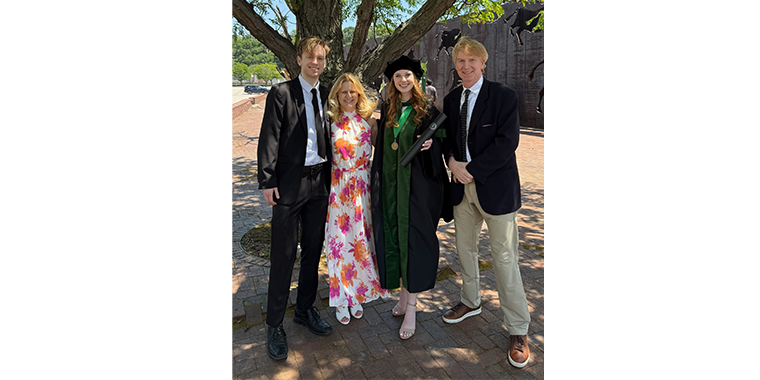When Olivia Langton started medical school at Kansas City University (KCU), she expected to be challenged. What she didn’t expect was her class would one day help her make sense of a personal crisis.
During an academic block in gastrointestinal and genitourinary (GI/GU) systems, something just clicked.
“I found the GI/GU systems to be so interesting and so unique,” she said. “They made sense to me more than anything else.”
But just as that course was wrapping up, her family was blindsided: her 21-year-old brother, a healthy, cross-country runner, was diagnosed with stage IV colorectal cancer.
“I was thinking it was probably just an ulcer or something at his age,” she recalled. “My mom called me crying. It was awful.”
The diagnosis came after routine lab work showed anemia. A follow-up test revealed blood in his stool, which lead to a colonoscopy and then the life-changing news.
“The timing was really staggering,” Langton said. “It fell right after learning about the GI system and right before a class on mechanisms of disease, including cancer development.”
While colorectal cancer is becoming more prevalent among younger people, it remains rare for someone so young. Genetic testing eventually uncovered the reason: her brother has a hereditary condition that increases the risk of certain cancers due to mutations in mismatch repair (MMR) genes. Langton soon discovered that she has it too.
“With this condition, it’s like the body’s natural proofreaders are not working and not fixing things,” she explained.
Though the news was initially overwhelming, Langton quickly reframed her perspective.
“It was jarring,” she said. “But I came to the conclusion that I’ve always had this genetic mutation, I just know about it now. With more information, I can be more vigilant about surveillance. I can mitigate my risks as much as possible.”
Now, Langton gets annual colonoscopies and takes an active role in protecting her health. She jokes that in twenty years, when her peers begin routine screenings, she’ll be the one coaching them through it.
Thankfully, her brother is cancer-free after undergoing chemotherapy and immunotherapy. He’s pursuing a master’s degree in business administration.
A 2025 graduate of KCU’s College of Osteopathic Medicine, Langton is beginning an internal medicine residency at the University of Minnesota, where fittingly, her first rotation will be in gastroenterology. Her journey also sparked an interest in global health, following trips to Kenya and Guatemala. After residency, she hopes to either pursue a GI fellowship or complete a chief residency year.
For Langton, the path hasn’t always been linear—but it’s been meaningful. Her advice to other medical students is simple, yet profound.
“Pay attention to what you love,” she said. “You might be surprised—and it could lead you to what you’re meant to do.”




(0) Comments